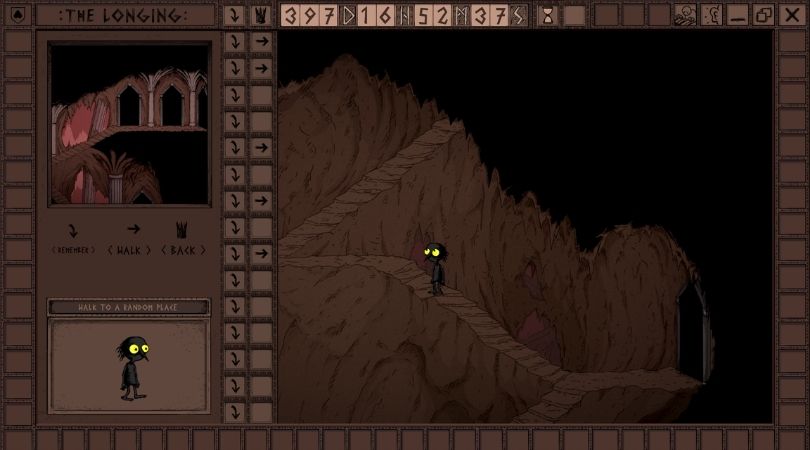
Created by German developer Studio Seufz and published by Application Systems Heidelberg, who describe it as “an unusual mix of adventure and idle game,” The Longing places you in the shoes of a lonely Shade—a small, shadowy creature with bright, bulging yellow eyes—as he embarks upon a lone vigil as the last servant of a labyrinthine underground kingdom. Muted and stark, The Longing is set within an entirely hand-drawn map brought to life with spindly, wandering lines in a style reminiscent of Edward Gorey’s unsettling Edwardian scenes combined with the surreal, immersive scale of René Laloux’s Fantastic Planet, all blanketed in an evolving, ambient black metal soundscape.
In the game’s opening moments, you’re instructed by the king to wait for 400 days as the sovereign goes to sleep and regains his strength and to wake him once that time runs out so that he may finally rid the world of all fear and longing. The only rule: don’t leave the caves.
What’s unique about The Longing is that those 400 days pass by in real-time, making it one of the longest games in existence at 9,600 hours. As soon as the Shade awakens in the unfurled hand of the statuesque king, a countdown begins at the top of the screen that follows you throughout the course of the game. The clock continues even when you’ve quit the game or turned off your console. Your time is entirely your own to spend as you wish. As the Shade, you can simply walk around, exploring the caves and discovering their secrets. You can find a hidden library filled with actual full-length e-books sourced from Project Gutenberg or sit at your desk and draw. You can also collect resources like coal, crystals, wood, and minerals to decorate your cave and build furniture, making it feel more like home during your long and lonely wait.
The process of easing into The Longing reminded me of my experiences first acclimating to meditation. Especially when you’re used to the fast pace and instant gratification of so many contemporary titles, starting the game can feel jarring. As the Shade, you climb down from the hand of the gently snoring king. Then you begin a long, slow trek up a winding staircase, only to eventually disappear into the yawning portal of a door descending into more darkness as the game’s immersive dungeon-synth soundtrack pulses around you. Your Shade walks slowly, perhaps described more aptly as a crawl. There are no items or upgrades to speed things up. There are no enemies to fight, no particular goals to achieve other than those you set out for yourself. Your long strolls are occasionally interrupted by the Shade musing aloud to itself, its personality a charming mix of ennui and optimism as it looks forward to its king’s awakening.
The result of this slowed-down, intentional play is that unlike in other games, which I play to get out of my own head. In juxtaposition, The Longing becomes a vehicle for getting comfortable being alone with my own thoughts. When there’s nothing to do but walk, I can’t distract myself from embracing the loneliness. At first, it was frustrating—I wanted my Shade to walk faster; I wanted to know if the path I was following would result in a dead-end before I arrived.

When I opened a stone door that was so heavy it took several minutes to become wide enough to let me pass through, I wanted to throw my Switch across the room. But the frustration was also a lesson. It forced me to appreciate the gift this game was giving me, the gift of time. I began to pay closer attention to my surroundings. I got excited at every item I found, even lowly pieces of coal. Stumbling upon a secret in the caves, even those that ended in disappointment, were cause to celebrate.
I love games that challenge my perception of play. Put another way, I don’t always play games to have fun, though fun is often a fortunate side effect. I’m drawn to games because I often learn something about myself through the experience of being someone else. As we continue to slog through the waning days of the coronavirus pandemic, it can feel like a lot of hurrying up to wait—waiting for a vaccine appointment, for reopenings, for opportunities to reunite in person with friends. I’ve spent much of the past year distracting myself, constantly filling my mind with content so as not to confront the pain and grief of isolation. If anything, The Longing permits me to process everything I’m feeling and thinking on my long, lonely walks with the Shade. Just as it is doing in its own long wait for change.
Originally released in 2019 for Windows and PC players, The Longing was made available for the Nintendo Switch just last week during Nintendo’s Indie World Showcase on April 14th. I find that it’s a game that works really well playing handheld on the Switch. You can take it on walks or curl up with it on the couch; the portability of the Switch means you don’t have to be tied to your computer during your interminable wait. The game can be controlled by both the D-pad and buttons as well as by touch. However, the small buttons and lack of descriptions create a slight learning curve in figuring out how to pick up items and get your Shade to remember its routes home.
While The Longing isn’t for everyone, it’s an excellent exercise in expanding our definition of what video games can be. You can explore and get to know your Shade, filling its home with warmth and making it happy as it longs for its king to awaken. Or you could put the game down, turn it off, and never open it again until the 400 days have passed. The choice is entirely yours. The Longing rewards your curiosity, invites you to sit with your feelings, and reminds us of the importance (sometimes) of being alone. And, if anything, it’ll teach you that patience is a virtue.
The Longing is available now on Mac, PC, Linux, and Nintendo Switch.
The longing
-
Rating - 7.5/107.5/10
TL;DR
While The Longing isn’t for everyone, it’s an excellent exercise in expanding our definition of what video games can be. You can explore and get to know your Shade, filling its home with warmth and making it happy as it longs for its king to awaken. Or you could put the game down, turn it off, and never open it again until the 400 days have passed. The choice is entirely yours. The Longing rewards your curiosity, invites you to sit with your feelings, and reminds us of the importance (sometimes) of being alone. And, if anything, it’ll teach you that patience is a virtue.






